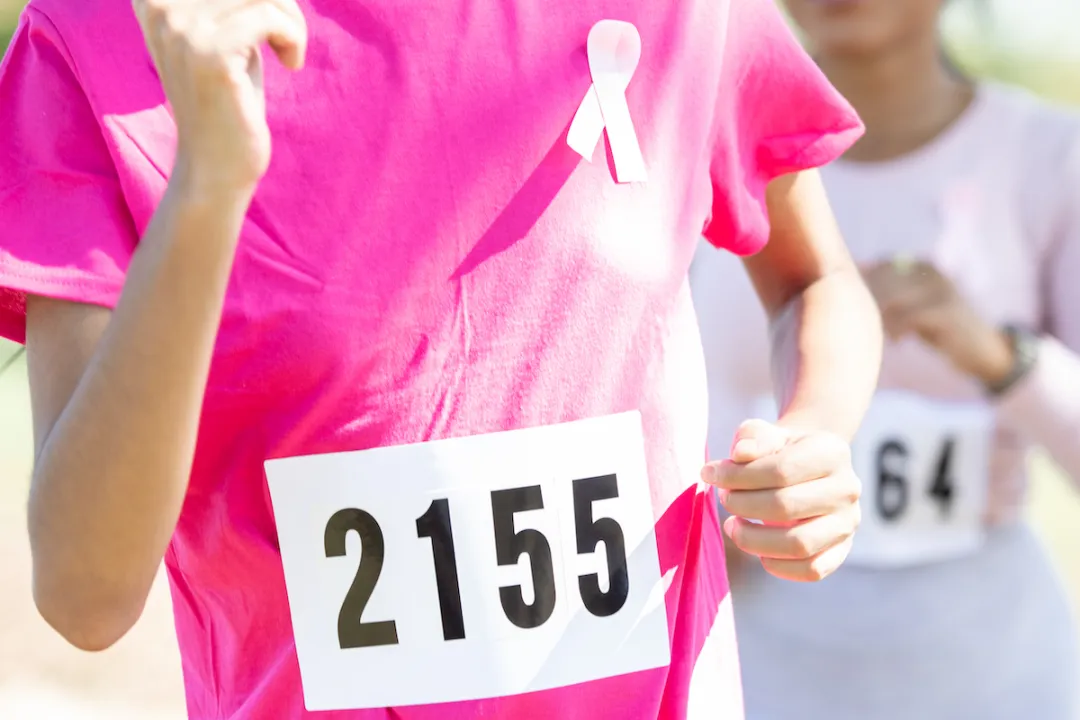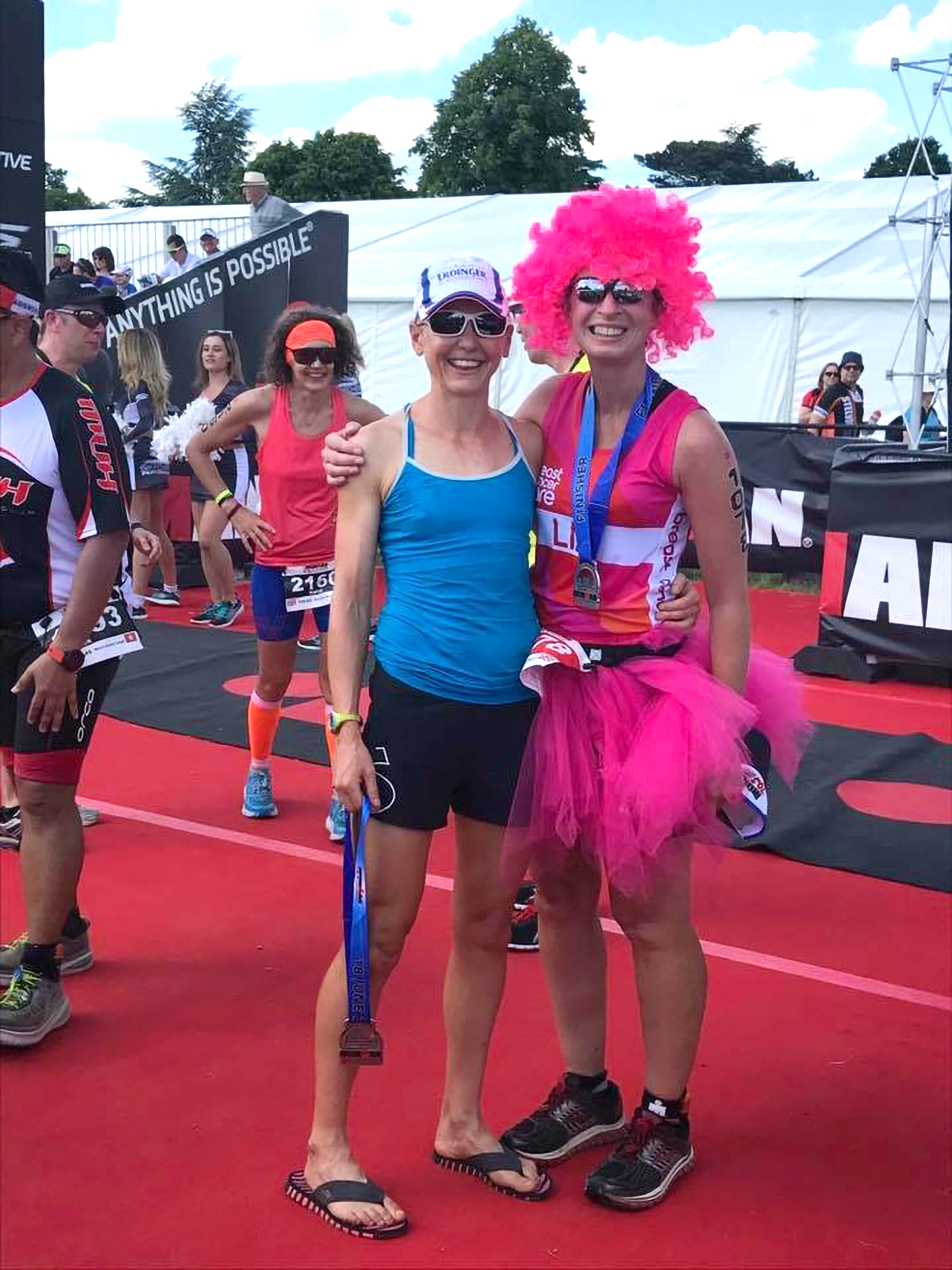How training can help ease cancer treatment symptoms
Breast surgeon Dr Liz O’Riordan never expected to become the patient. Here she tells us how triathlon turned out to be her healing power during treatment for breast cancer, and shares her advice for other patients wanting to stay active…

Breast surgeon Dr Liz O’Riordan was diagnosed with breast cancer in 2015, aged 40. Defying doctors’ orders not to exercise, she continued training during her treatment – even completing a sprint-distance triathlon – which, as she details here, helped her cope with the many and varied side effects…
Liz on her sporting background…
When I was at school I hated most sports, but I raced butterfly and breaststroke as a teenager. During medical school, though, I didn’t have the time to train properly. I’d join a gym and never go.
I did the London marathon when I was 30, completely clueless. It took me 6.5hrs and I loved it, but I said never again. Through my husband I got into cycling, but I wanted a sport just for me, so I looked into triathlon.
Like a typical surgeon, I read every magazine and bought every book. My husband got so fed up of me never actually doing one that he signed me up for the Olympic-distance London Triathlon just after I turned 40 in 2014.
I loved that feeling of achievement and doing three sports and having a really structured training. And I also loved the medals, because it is about the bling!
Liz on her first cancer diagnosis…
In 2015, I was diagnosed with breast cancer. And I’m going to be honest here – I didn’t check my breasts every day. I thought I’m not going to get breast cancer, I’m a breast surgeon. It’s not going to happen to me.
I wondered whether exercise could help with all the side effects of the treatment but there wasn’t much research on it. All the conferences I went to were about breast cancer treatment, not about exercise. Even as a breast surgeon, I had never told my patients to exercise. But it can reduce the risk of recurrence. We didn’t really know that then.
Liz on training and racing tri through chemo…
I cycled to my first two chemo sessions. After my second one, I got bollocked by the nurse who said I might’ve got an infection because my blood count was really low.
The joy I’d felt at cycling there and achieving something not related to cancer was taken away. I thought, ‘I’m not going to get a serious infection on my bike. I’m not going to fall over and suddenly
get sepsis.’ And I felt really sad that they didn’t get it.
I did my first parkrun during chemo. I was bald. I was nervous that people would stare, but when I’d finished a guy came up and gave me a hug. He was called Steven, he’d had cancer and he’d been doing parkrun every week that he could during treatment.
I wanted to do my local cycling club sprint triathlon. It was pool-based, and I had to persuade them that if I felt ill I would stop. I did it. It took almost two hours, but that feeling of crossing the line halfway through chemo was incredible.
After my mastectomy, I walked every day and jogged when I could. Some days I could only walk a hundred yards before stopping to spit or be sick, but I did it. And I swear it made a difference to the impact of chemo, both mentally and physically.
But the best cure for fatigue really is to exercise. I used to get up at six o’clock in the morning and walk with my neighbour over the road for half an hour, so it was done. I could then feel I’d earned the right to go and sit on the sofa.

Liz on her first 70.3 post-treatment…
I did 70.3 Staffordshire a year after finishing all my treatment, in 2017. I also did RideLondon 100 on a tandem with my husband, cycled the Maratona dles Dolomites, and swam two miles in the Serpentine
to get my London Classics medal.
A random internet search led me to Tanya Slater, who runs bike camps in Lanzarote. I went along and I just found a tribe of incredible women in their forties, fifties and sixties who were doing incredible sporting achievements. They encouraged me and cheered me on, it was just fantastic. I asked Tanya if she’d coach me and she said yes.
Because as a surgeon, I’m very A-type. I’m focused on the goals. I’ve got to be fast. I’ve got to do this. And she said, “No, you have to allow your body time to heal. This [Ironman 70.3 Staffs] is not about getting a fast time, this is about getting round.
I think a lot of athletes who get cancer want to overtrain – they’re used to doing three-hour runs or whatever. So they want to do that during chemo and you just get sick. You have to give the body time to heal from the treatments.
For me, [training for 70.3 Staffs] was a time to actually do the proper base training, to do the weight training, the flexibility, the stretching, to kind of train me fully rather than just doing the aerobic stuff.
I had a local recurrence in 2018, and another in July this year. I had to retire as a breast surgeon in 2018, and now my training and racing goals are to stay fit and active, but I still hope to do an Ironman one day.
Liz on her current training regime…
I’m someone who normally needs a goal to aim for, but with the not knowing what cancer treatment lies ahead, I don’t want to give myself a big goal and then fail.
But I still swim in a pool and in rivers and lakes near me. I still love riding on my bike with my husband and doing our tandem rides. And I still do the parkruns. So I am kind of triathlon training, keeping all three sports ticking over.
I’m sure once I’ve finished treatment, I will set myself another goal. I’d love to try and start with another half [Ironman] to try and get my run speed down.
Liz on training advice for cancer patients…
We now encourage cancer patients to exercise three times a week, if they can, aerobically for half an hour. So you’re a bit hot and sweaty. And to do it by time, not distance. Resistance-based exercises can really help, too – I used resistance bands and dumbbells at home.
One of the biggest criticisms I get when I say exercise can help is people want to know why. How does exercise help? It reduces the risk of recurrence, it improves the symptoms almost at mitochondrial cellular level. And I find that fascinating because you can go and buy paracetamol without caring how it works, but you know it helps your headache. And you’ll go and drink alcohol knowing it can cause cancer, but you drink it anyway.
But there seems to be this barrier. And we don’t know yet exactly how it works on a cellular level. We just have trials that have looked at people who don’t exercise and people who do and seen the benefits.
I think exercise can be a dirty word. It’s really hard to tell someone to get off their bum and to exercise when they’re struggling with chemo. And it doesn’t need to be expensive. You don’t need a gym. Give every patient a resistance band so they can do the training at home.
I would love to see every patient told [about the benefits of exercise], almost like it’s the fourth treatment. You have surgery, you may need chemotherapy, you may need radiotherapy and you exercise, and it’s like a contract. Your doctor is going to give you the best treatment the NHS can offer, but you need to exercise as your part of the bargain, to help that treatment have the best effect, to help you cope with that treatment, and to reduce the risk of your cancer coming back.
I’d love for the money and funding to be available to get the resources in hospitals, so there are gyms that patients can go to while they’re waiting to be seen – because the clinics always overrun. And for every single leisure centre to have proper trained professionals to help with training during treatment.
If you are going through cancer treatment, your number one priority has to be to let your body heal from the drugs that you’re being given or from the operation or from the radiotherapy. You’re not going to be doing the training you were doing the week before you were diagnosed.
You may need to think, ‘Right, I’m going to take six months or a year off to reset.’ And during that time, do the base work, do the strength, do the flexibility, do those low, slow base miles, just to keep yourself ticking over. Because it can take a year for your body to recover after chemo. It can age you 10 years. Radiotherapy can be exhausting and there’s no point fighting it.
And one week you’ll be really, really slow and it doesn’t matter. Forget your times before training and do it for fun. Train because you want to, not because you have to, and just get that freedom of running or swimming or cycling, exploring a new route and stop looking at the data.
When I was training during cancer treatment, it’s the one time I felt like Liz. I was just me. I wasn’t a cancer patient. I wasn’t having chemo. I didn’t feel sorry for myself. It was my time to be amazed at what my body could do.
Cancer doesn’t mean an end to your sporting life. It just may be different, you may even be better and faster than you were before.
Liz is an ambassador for 5K Your Way in Bury St Edmunds, which encourages cancer patients to keep exercising. Her memoir Under the Knife tells her cancer story as a surgeon and patient.




